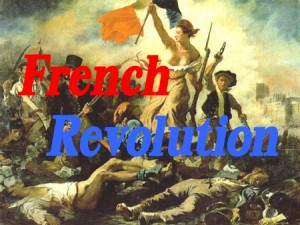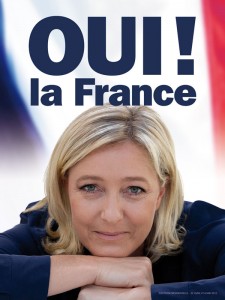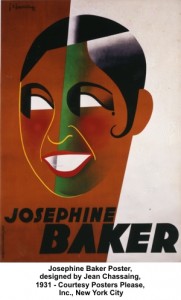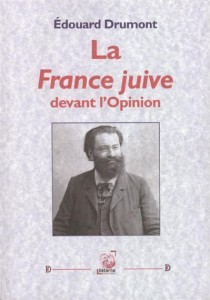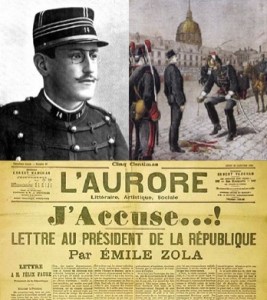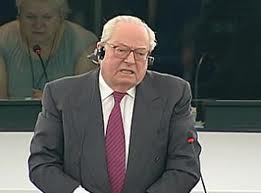The twenty per cent polled by Marine Le Pen in the recent first round of elections in France has come as a shock to many. She is said to have softened the often blatant racism, xenophobia and even fascism of her father who founded the Front National. Jean-Marie Le Pen and his daughter are said to lead a ‘far right’ party and Marine herself is called a candidate of the ‘right’.
Yet how much of the Front National’s success can be laid at this supposed ‘softer’ image? Our memories fail us if we are to take this assessment at face value. The bicentenary of the French Revolution in 1989 included celebrations of ethnic diversity. African-American operatic diva Jessye Norman was invited to sing Marseillaises in the Place de Concorde as director Jean-Paul Goude projected the Revolution as something akin to world culture. Only the Front National explicitly rejected the updated message of 1789 which now included feminism, civil and human rights, anti-racism, cultural and racial inclusion, as well as widening the message of the Revolution of social justice. Yet only thirteen years later the presidential ballot of 5 May 2002 saw a run off between Chirac and Le Pen, arguably a much better success than that achieved this week by Marine. The French were forced to ask themselves why they had such a powerful Far Right party comparable in strength to analogous movements in Belgium and Austria, and in fact more powerful than neo-Nazi elements in Germany. France now had the very real possibility of having the first unashamedly fascist style government since the time of Vichy. Was this not a diametric opposite of everything which 1789 had envisaged? Yet at the same time was it really so unsurprising? Is the flourishing of extreme racism and ethnocentrism perhaps a direct result of the French Revolution itself? France, the birthplace of Jewish emancipation in Europe and the Rights of Man has in many ways become the intellectual lab of anti-Semitism, racism and prejudice. Indeed the country has become host to the largest post-war fascist, racist and national socialist movement. France claims to stand in stark contrast to the Anglo-Saxon policies of multiculturalism as found in Britain, America and Canada, with its unitary policy of assimilation. Of course the contrast between the naive ideal theory and reality could not be greater. Did Jacobinism unleash something sinister which has pervaded French social and political thinking ever since?
France in the 1920s became a cockpit of exotic cultures. Modernist art combined elements from Africa and Polynesia. Jazz, which had arrived with American troops in the First World War, flourished and became an integral part of the social and cultural life of Paris attracting African-Americans denied equality in their own country. The exotic dancing of Josephine Baker led French men to queue for the Revue Nègre. Sidney Bechet the saxophonist was another who came while Louis Armstrong felt at home in Paris. Jazz was attractive because it was both primitive and modern, the bodily expression of dance expressed through the latest technology of wireless and gramophone. Enthusiasts insisted on authenticity known as le jazz nègre. Black Jazz was said to have colonised Paris with Le Hot-Club in Paris reaching international status in the world of this music genre. Yet there was also a move for ‘French jazz’ to divorce the music from its African-American origins. With global depression it was obvious that French modernism was a minority taste. Rampant xenophobia reared its ugly head as ‘alien’ black and foreign musicians were denied employment. From the 1920s the pages of L’Action française Maurras regarded modernism as subversive to French tradition with ‘black jazz’ being especially ascribed as decadent. Surely this stands in contrast to as education system and state authority impose a uniformity which mitigates against multiculturalism? People of all ethnic backgrounds should conform to the national stew and unity of the republic. The official French doctrine, derived from the ideals of the Revolution, then of the état laïque, is that since all citizens are equal in rights, so their racial origins, or their culture or religion, are purely a private matter. From this it follows, first, that official research and statistics about origins are not allowed. While France reached greater prosperity in the 1960s the largely Maghrebi, Portuguese and Spanish inhabitants of the bidonvilles were excluded. Even with their clearance in 1964 the resultant ghettos continued to seal off any social mobility. The republic’s ideal of conformity ignored the reality in the banlieus, tower block suburbs of La Courneuve, Aubervilles and Saint-Denis outside Paris which in places of worship, food and colloquial French are very much a different world from republican values. The government expects immigrants to integrate fully while rejecting any notion of multiculturalism as practised in Britain. Yet the minorities are rejected by the white host community. Racism against non-whites, largely Maghrebis and blacks, has replaced the xenophobia once prevalent towards Poles, Italians and Portuguese. But the Europeans were able to integrate into wider French society because they were white. Laws to tackle racism are difficult to enforce. Discrimination in jobs and by the police weighs heavily on French non-white minorities. Whites move out of housing or schools where Maghrebis and blacks congregate too much thus creating ghettos in diametric opposite to France’s official policy of integration.John Ardagh, formerly of The Times and the Observer in his 1999 book France in the New Century Portrait of a Changing Society (Viking, London, 1999):
“The State promotes an integration which the public then obstructs; the public stresses cultural differences which the State refuses to recognize. That, in a word, is the basic dilemma of immigration today in a France that officially does not accept multiculturalism or ethnic communities. On the one hand the State regards all citizens as equal, with the same full rights, and turns a blind eye to any distinctions between them of race or culture. But the French public, in its mass, does not regard immigrants as fully or equally French, and will constantly remind them of their otherness. The State expects those who become French citizens to integrate fully, and many immigrants would themselves like this: but the French people make it hard. Conversely, many immigrants would like to retain something of their own culture and identity: but the French State in turn makes this hard. It is a terrible paradox. A Breton, for example, is easily accepted as Breton yet also fully French: but the many Beurs who see themselves as French Arabs, and would like to be respected as such find it much more difficult. Although they may hate the American model, they sometimes envy its acceptance of diversity.”
The French Revolution of 1789 provided the civic idea of the nation, one in which the collective sovereignty of the inhabitants as citizens in a given territory constituted both state and nation, regardless of ethnicity and language. The civic nation has since become synonymous with constitutional democracy, the rule of law and human rights. From the perspective of eighteenth century Europe, nationalism was a subversive doctrine which introduced the notion of popular sovereignty as the basis of legitimacy of government, substituting that of divine right of kings. The new legitimacy therefore came from the nation. But Robespierre and Napoleon were also the first modern dictators and worked on the premise that they served the ‘general will’. Inspired by Rousseau’s divination of the people, Robespierre divided the French into two binary opposites: people and enemies. The latter were to be exterminated and indeed 50,000 people died in the Terror. The Nazis were in fact to emulate the Jacobins in minute detail. The terror is not a side-effect of the system. It is the system. The earthly paradise can only be achieved when the ‘enemy’ is eliminated. Massacres are necessary in an ideology in which killing is an inherent element and takes on a momentum of its own. Rousseau, prophet of the 1789 revolution, provides the antithesis of liberalism by creating an anarchic individualism, an individualism which extends from the intellectual sphere to that of the passions. He appealed to existing la sensibilité, proneness to emotion, which was admired by cultivated people in eighteenth century France. This overturned existing conventions by justifying direct and violent emotion uninformed by thought and for this reason is the father of what we recognise as fascism by introducing the virus of the totalitarian state. After all the Social Contract claims to solve the problem by allowing freedom without the brute force needed for order. In this context we can understand why Poles who flocked to Napoleon’s banner found revolutionary rhetoric to be empty of real liberation because French imperialism oppressed them even more than the tsar. More ominously disillusionment with French rule led German thinkers to seek answers in a spiritual quest which became romanticism. The French Revolution had therefore led to the exaggerated imperialism of Napoleon, and the rise of a romantic conception of national cultures notably by German thinkers such as Fichte, Herder and Hegel, imprisoning humanity into certain uncompromising categories of nation, ethnicity and therefore race.
This was noticeable in the cradle of revolution itself. The French historian Tain said that the revolution of 1789 had brought forth barbaric, animalistic baboon types. The Parisian bourgeoisie deployed language such as classes dangeruesses in racial terms describing the proletariat as being of low intelligence, violence, raw animality and moral corruption. For the ideologue of modern racism, Arthur de Gobineau, this was not an age of progress but one of despair as he translated aristocratic fears of the seething masses into racial terms in his 1855 book Essaie sur l’inégalité des races humanes (Essay on the Inequality of Human Races) asserting that whites or Aryans were the master race. The fissures of 1789 were manifest in the language of identification to act in the best interests of France brought to a head in the anti-Semitic Dreyfus Affair where Radicals and socialists found themselves as patriotes pitted against right-wing nationalistes in an obvious overlap of self-descriptive language. Anti-Semitism was an essential glue for Nationalists who saw the true French nation as excluding the Jews who supposedly ruled them. In 1902 the Scènes et doctrines du nationalisme by Maurice Barrès articulated an organic French society which emphasised rural culture and respect for ancestry as opposed to the rootlessness and materialism of urban industrialised society. A central concept in this French nationalism was that of the Jew as outsider and traitor. The Jew was the perfect ‘Other’, symbolising everything that was not organically French. In 1886 the failed publicist Edouard Drumont produced La France Juive employing Gobineau’s terminology of Aryan and Semitic to describe races and reach out to those who felt left behind during France’s industrialisation such as small traders struggling against large department stores. Drumont blamed Jewish high finance and capitalism even though most department stores were owned by Catholics and Protestants outnumbered Jews in banking. When workers in Fourmies in 1891 protesting for an eight-hour day were fired upon by troops, Drumont blamed Jews for the massacre in his attempt to use anti-Semitism to garner proletariat support. But of all the hate preachers of organic nationalism few surpassed Charles Maurras for whom the guilt of Dreyfus was self-evident simply because he was Jewish.
Yet the little known fact is that organic French nationalism lagged behind the Left.In their book Why the Jews?, Dennis Prager and Joseph Telushkin:
“The belief in Jewish world domination was spread during the twentieth century through the Protocols of the Elders of Zion, and used by the Nazis as a justification for genocide. This mythical worldview was first introduced into the West’s consciousness not by racists, Fascists, or Nazis, but rather by socialists in nineteenth-century France.”
In the early nineteenth century, Pierre Leroux coined the term “socialism” and identified Jews with capitalism and exploitation of the French proletariat. Along with Henri de Saint-Simon, Charles Fourier was a founding father of French socialism, and he referred to Jews as “parasites, merchants, userers”, and was against their emancipation. In 1845 Alphonse Toussenel’s Les Juifs, rois de l’époque (The Jews, kings of the Epoch) said cosmopolitan Jews dominated Europe. But the most extreme attitude was perhaps taken by Proudhon who justified pogroms in Russia and in December 1847 and said all Jews must be exterminated or expelled to Asia. During the Dreyfus Affair, the French socialists were either indifferent or even hostile to the army officer’s plight. When they eventually did take a stand, they made it clear that the Jewish element in the persecution was irrelevant.
Unhappy with what he saw as a republic dominated by opportunist politicians influenced by the Rothschilds and Reinachs, Edouard Drumont made his fortune from the thousands of La France Juive sold and in the process politically transformed anti-Semitism from an originally socialist weapon peddled by Proudhon. Jews were now not just usurers and capitalists but the cause of all evils through parasitic capital which fleeced peasants and large department stores which undermined the small shopkeepers. Drumont’s slogan was La France aux Français which he circulated through the new paper he founded in 1892, La Libre Parole. In 1889 the Ligue Nationale Antisémitique de France was founded and led by the Marquis de Morès, with a vice president who actually called himself a “national socialist”.
With a new nationalism that denounced economic injustices, the rich, parliamentary democracy and called for a fervently authoritarian state, there was also a French socialism which was national and not international. Barrés used the term Socialist Nationalism and it reared its ugly head during the Dreyfus Affair when Jews were denounced as not being French. In the words of Maurras:
“[A] form of socialism which, when stripped of its democratic and cosmopolitan accretions would fit in with nationalism just as a well-made glove fits a beautiful hand.”
Although his L’Action Française made great efforts in appealing to the French proletariat, Maurras was now being superseded in both his nationalism and working-class appeals by the former members of the French Left. In, 1903 the former “Red” socialist Pierre Biétry founded the Nationalist Socialist Party which espoused “Yellow” socialism: national solidarity in lieu of class conflict, where private property would be sacrosanct, and workers would benefit from profit shares as management and unions worked side by side. Anti-Semitism, a strong state and the personality cult of leader were other essential elements. The emergence of Federation des Jaunes de France was the model for similar European groups such as the DAP (German Workers Party) which emerged in Austria in 1903, and the national socialism of Enrico Corradini in Italy. Yellow unions had their origin in workers opposed to the strike of 1899. Lanoir established the Bourse de Travail in Paris and gained the support of the nationalist majority on the city council. Biétry had in fact been his deputy until rebelled against his authority and was expelled. This led to him forming the Fédération des Jaunes and the Nationalist Socialist party, the latter collapsing within a year. Elected to parliament for Brest, Biétry formed Le Parti Propriétiste anti-étatiste with a platform to defend property ownership for the small man not big industry. Indeed he opposed capitalists and especially Jews, proposing the nationalisation of the Western Railway to be run by its own employees. Yellow socialism hence resembled what would later be called fascism. Maurras emulated attempts by Barrès in the 1880s to create a union of nationalists and socialists by reaching out to that prophet of syndicalism himself, Georges Sorel. A Proudhon Circle was set up by Georges Valois to develop an axis of both Nationalists and Radicals to combat the Republic, Jews and capitalists. The resultant ‘integral’ nationalism was therefore based on excluding everything defined as anti-France. Sorel in his 1908 book Révolution sur la violence saw workers responding to the idealist myth of a general strike and advocating violent change.
Yet xenophobia and racism continued practised by the traditional French Left. In 1910 French seamen in Marseilles went on strike against the employment of Kabyles by the merchant navy. From 1910 to 1912 Italian immigrants in oil refineries fought with North African strike breakers. In 1913 Kabyles were attacked by Belgian immigrants in the coal mines of northern France. In World War I French trade unions lambasted colonial workers for lowering the wage levels of native whites. From 1917 African workers were subject to violent street level assaults by the French proletariat in Dijon and Le Havre. The Hatmakers’ Union campaigned against the immigrant “lepers” while the Hotel Workers’ Federation targeted an invasion of foreign labour. Le Peuple, mouthpiece of the General Confederation of Labour denounced foreign labour. Violent clashes occurred in 1931 between French workers on one side with their Belgian, Moroccan, Italian and Polish compatriots used as strikebreakers or competition. Even the Communist Party claimed “La France aux Français!”. French Communists were hostile to refugees and the racist and anti-Semitic venom spewing from its own mouthpiece ironically named L’Humanité led communist Jews in 1938 to form their separate Union des Sociétés Juives. Of course after 1945 the communists joined the national postwar amnesia as it conveniently hid the two year alliance of Hitler and Stalin which they had supported. During this postwar period the PCF (French Communist Party) dropped all pretence of anti-colonialism in order to champion national imperialism. Stressing unity and assimilation the PCF said it was in the interests of the colonies to remain French in order to be safe from American imperialism. The USSR with its many nationalities was cited as a template for a fully democratic imperial France of 100 million citizens of all races. The PCF’s anti-Americanism led them in 1954 to forge an axis with Pierre Poujade and his UDCA’s attack on Jews, foreigners and support for colonialism in Algeria. Le Pen was to emerge from this Poujadist fold. From the 1960s the PCF complained that conservative governments were dumping immigrants in the working-class suburbs, industrial zones and communes that encircled Paris. From 1978 PCF mayors blocked access to public housing by immigrants. A quota of fifteen percent was imposed on immigrant children attending summer holiday camps for youth from deprived backgrounds. On 5 November 1980 the Political Bureau of the PCF condoned this official racist strategy. In Vitry the PCF mayor went so far as to lead the bulldozing of an immigrant worker hostel. In February 1981 the Communist mayor of Montigray, Robert Hue, coordinated a harassment campaign against a Moroccan family accused of drug-dealing. Hue later became leader of the French Communist Party. The erosion of its traditional working-class base led the PCF to adopt a strategy of racist populism. This was barely distinguishable from Le Pen who himself managed to attract working class vote to the Front National, support that previously went to the Communists. Indeed the party has overtaken the PCF in becoming the foremost proletariat party in France, while also gaining support from farmers and small tradesmen. Front National has established its own parallel trade unions which are very strong in the police and prison service. Gaining greater proletariat support than Maurras had ever enjoyed, the situation was complicated in places such as Marseilles where dockers were quoted as both members of the Communist CGT and supporting the FN.
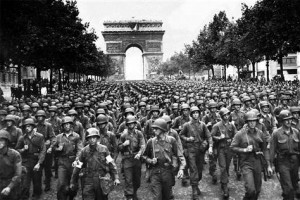
U.S. soldiers of the U.S. 28th Infantry Division march along the Champs Elysees on Aug. 29, 1944, four days after the liberation of Paris
Vichy is a collaborationist period which French leaders have consistently failed to come to terms with. Voting power to Pétain at Vichy in 1940 was no impediment in René Coty becoming president in 1954. Indeed successive presidents laid wreaths at the Marshal’s tomb. It was only in 1995 that President Jacques Chirac admitted the inescapable guilt of Vichy in the deportation and extermination of French Jews. But Vichy is perhaps merely a reflection of the snister flipside of the revolutionary heritage which has shaped modern France. Towards the end of his life it was revealed that socialist president François Mitterand had been associated as a student with the Cagoule or Comité Secret d’Action Révolutionnaire, founded in 1937 by Éugène Deloncle as a radical and violent offshoot of the anti-Semitic paramilitary Action Française. In February 1935 he was photographed on a march against foreign students with the banner “Go on strike against the wogs”. Mitterand also wrote for a newspaper which admired Mussolini and became leader of a nationalist student group. Indeed he later served with the Vichy regime. As head of state he never formally acknowledged the collabarionist national stain. Even as socialist president Mitterand even then he insisted that the state bore no responsibility for what happened to Jews during the Occupation and Vichy. But he was far from the only Leftist in Vichy. Admiral François Darlan was a radical socialist and republican who in 1940 joined Pétain’s regime as Minister of Marine Affairs, and also met Hitler twice and drafted legislation for Jews to be deported to the death camps. Maurice Papon belonged to the Radical Socialist Party, joining the Air Ministry in 1931 at age twenty, and in 1936 took a role with the Popular Front government of the Left, only to Vichy Ministry of the Interior in 1941 and take an active part in rounding up Jews for extermination. Papon his racist and repressive policies into the 1950s by crushing Algerian demands for independence as prefect of Constantine. He also imposed curfews on Algerians in Paris and blocked enquiry into the massacre of forty of pro-FLN demonstrators in Paris on 17 October 1961, and the subsequent and incarceration of thousands. He managed to keep his Nazi past hidden until 1981 as he served successive French government. Réne Bousquet had also come from a radical socialist background yet became a Vichy prefect in 1940, and head of national police in 1942. He was so successful in the round up and deportation of French Jews that he greatly impressed Himmler.
France has always accorded a great respect to its intellectuals and it was here that Holocaust denial found its first pseudo-academic hero and he was firmly a creature of the Left. In 1948 Paul Rassinier published Le Passage de la Ligne (Crossing the Line). This first book as with the sequels attacked survivors’ claims regarding the atrocities committed by the Nazis, especially in there being an explicit and deliberate plan by the Third Reich to exterminate the Jews. In 1977 Rassinier’s books were reissued in one volume. By now he was denying that there were even any gas chambers. Dismissing the credibility of testimonials from Holocaust survivors, he stated that concentration camps were evidence of the benign nature of the Nazi regime and that the Holocaust was merely being used by Israel as a guilt trip milk cow in order to financially exploit West Germany under the guise of reparations. The truth was prevented from emerging due the all-powerful nefarious network of Zionists. Such ideas being staple food for neo-Nazi groups worldwide and especially in France. Yet Rassinier had joined the French Communist Party in 1922 at sixteen, moving to the Socialist Party in the 1930s and even enlisted for the Resistance following the German invasion. Captured, he was incarcerated in Buchenwald concentration camp and on his release in 1945 he was elected member of the National Assembly as a Socialist. Serving for a year he then began a writing career which by exonerating his former Nazi captors provided essential foundations for the pseudo-academic undiscipline known as Holocaust denial. In the 1970s French anti-racists laid claim to droit à la difference, the right of ethnic minorities to retain their own language, religion and cultural identity. This was the antithesis of French republicanism with its tradition of assimilation. The New Right transformed this right to difference to defend European national cultures. This meant that the French had as much right to survive as Amazonian tribes. Mixing of cultures would damage the cultural identity of both host and minority communities. The only solution was an apartheid style separation which justified exclusion and repatriation of non-whites. French culture must be protected from being swamped and immigrants themselves were being damaged through contact with the superior numbers of Europeans among whom they lived by being allowed to recover their own traditions.To thsi effect Alain de Benoist founded Groupement pour Recherche et d’Études par la Civilization Européen (Research and Study Group for a European civilization), with the acronym GRECE, in 1968 at the age of twenty-five. GREC referred to classical Greece and emphasised it was an intellectual battlefield for what became the Novelle Droite (New Right). Taking the ideas of Italian national socialist Julius Evola, De Benoist looked to the pagan glory of classical Greece and felt that Christianity was an alien colonising ideology which had no place in Europe. It was this which caused a chasm with America’s New Right. Indeed de Benoist opposed the Americanisation of Europe through television, fast food, mass media and worship of the dollar. As he himself admitted in 1982:
“Better to wear the helmet of a Red Army soldier than to live on a diet of hamburgers in Brooklyn.”
He condemned NATO and dallied with the New Left during the May 1968 student uprising in Paris and claimed he was in favour of ethnopluralism, cultural diversity and preservation of ethnic identities. But his ideas were parallel to that of the National Front under Nick Griffin, who by 1985 had moved to a Third Positionist stance in praising black separatism, Khomeini’s Iran, Gaddaffi of Libya and Jerry Rawlings of Ghana.
De Benoist in 1993:
“Will the earth be reduced to something homogenous because of the deculturalizing and depersonalizing trends for which American imperialism is now the most arrogant rector? Or will people the means for the necessary resistance in their beliefs, traditions, and ways of seeing the world? This is really the decisive question that has been raised at the beginning of the next millennium.”
Bolstered by the ideas of Alain de Benoist, Le Pen often said that the native French were now the real victims of racism in France. He denied xenophobia and hatred, and even voiced his respect for Arab civilisation but stressed that Muslims would enjoy their own culture better in their own countries. By now Le Pen said it was no longer a conflict between capitalism and Communism but instead economic nationalism versus internationalism. Free market ideas were abandoned for statism, economic protectionism and anti-globalisation he also praised Saddam Hussein and condemned US military action against Iraq in 1991. was well received by the dictator in Baghdad, lauding him as a “great Arab patriot”.
In 1993 Charles Pasqua said that the Front National only reflected the same values as the majority. But rather than influencing the majority of French into becoming racist or sympathetic towards fascism, perhaps the Front National merely exhibits a behaviour pattern which can be traced back to Jacobinism itself. Calling Front National ‘Far Right’ only clouds its ideological origins on the Left and why in the second round of voting Marine Le Pen appeals even more to traditional socialists than to those who have supported Sarkozy.

